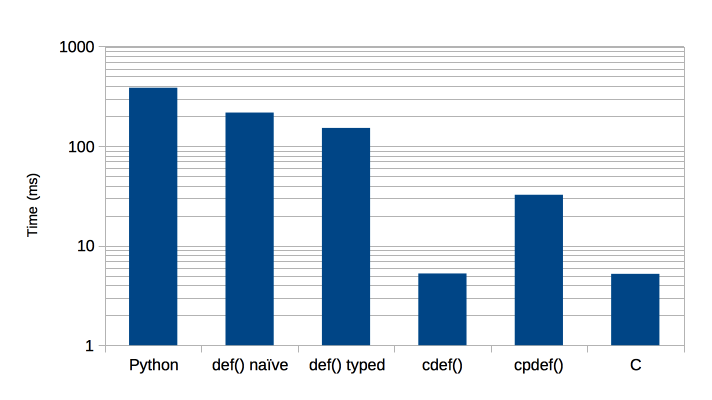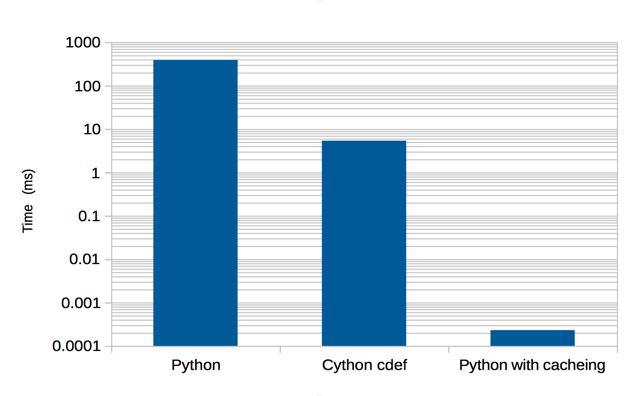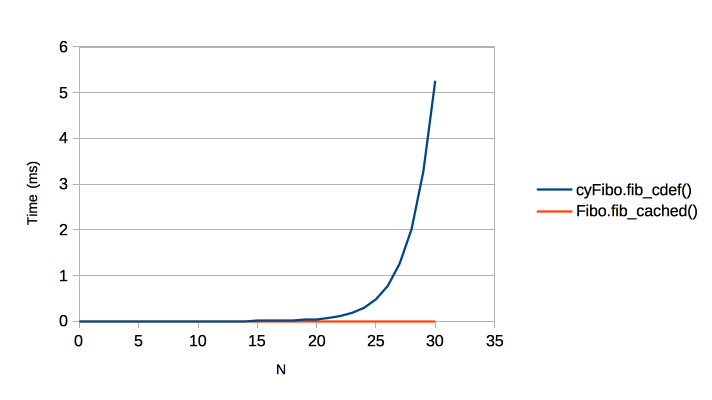How Fast are def cdef cpdef?¶
Code Example¶
Here is an example of computing the Fibonacci series (badly) that will be done in Python, Cython and C.
First up, Python [Fibo.py]:
def fib(n):
if n < 2:
return n
return fib(n-2) + fib(n-1)
In naive Cython [cyFibo.pyx], it is the same code:
def fib(n):
if n < 2:
return n
return fib(n-2) + fib(n-1)
Optimised Cython where we specify the argument type [cyFibo.pyx]:
def fib_int(int n):
if n < 2:
return n
return fib_int(n-2) + fib_int(n-1)
In Cython calling C generated code. Here we use a def to call a cdef that does the body of the work [cyFibo.pyx]:
def fib_cdef(int n):
return fib_in_c(n)
cdef int fib_in_c(int n):
if n < 2:
return n
return fib_in_c(n-2) + fib_in_c(n-1)
Now a recursive cpdef:
cpdef fib_cpdef(int n):
if n < 2:
return n
return fib_cpdef(n-2) + fib_cpdef(n-1)
Finally a C extension. We expect this to be the fastest way of computing the result given the algorithm we have chosen:
#include "Python.h"
/* This is the function that actually computes the Fibonacci value. */
static long c_fibonacci(long ord) {
if (ord < 2) {
return ord;
}
return c_fibonacci(ord - 2) + c_fibonacci(ord -1);
}
/* The Python interface to the C code. */
static PyObject *python_fibonacci(PyObject *module, PyObject *arg) {
PyObject *ret = NULL;
assert(arg);
Py_INCREF(arg);
if (! PyLong_CheckExact(arg)) {
PyErr_SetString(PyExc_ValueError, "Argument is not an integer.");
goto except;
}
long ordinal = PyLong_AsLong(arg);
long result = c_fibonacci(ordinal);
ret = PyLong_FromLong(result);
assert(! PyErr_Occurred());
assert(ret);
goto finally;
except:
Py_XDECREF(ret);
ret = NULL;
finally:
Py_DECREF(arg);
return ret;
}
/********* The rest is standard Python Extension code ***********/
static PyMethodDef cFiboExt_methods[] = {
{"fib", python_fibonacci, METH_O, "Fibonacci value."},
{NULL, NULL, 0, NULL} /* sentinel */
};
#if PY_MAJOR_VERSION >= 3
/********* PYTHON 3 Boilerplate ***********/
PyDoc_STRVAR(module_doc, "Fibonacci in C.");
static struct PyModuleDef cFiboExt = {
PyModuleDef_HEAD_INIT,
"cFibo",
module_doc,
-1,
cFiboExt_methods,
NULL,
NULL,
NULL,
NULL
};
PyMODINIT_FUNC
PyInit_cFibo(void)
{
return PyModule_Create(&cFiboExt);
}
#else
/********* PYTHON 2 Boilerplate ***********/
PyMODINIT_FUNC
initcFibo(void)
{
(void) Py_InitModule("cFibo", cFiboExt_methods);
}
#endif
Benchmarks¶
First a correctness check on Fibonacci(30):
$ python3 -c "import Fibo, cyFibo, cFibo; print(Fibo.fib(30) == cyFibo.fib(30) == cyFibo.fib_int(30) == cyFibo.fib_cdef(30) == cyFibo.fib_cpdef(30) == cFibo.fib(30))"
True
Now time these algorithms on Fibonacci(30) thus:
$ python3 -m timeit -s "import Fibo" "Fibo.fib(30)"
$ python3 -m timeit -s "import cyFibo" "cyFibo.fib(30)"
$ python3 -m timeit -s "import cyFibo" "cyFibo.fib_int(30)"
$ python3 -m timeit -s "import cyFibo" "cyFibo.fib_cdef(30)"
$ python3 -m timeit -s "import cyFibo" "cyFibo.fib_cpdef(30)"
$ python3 -m timeit -s "import cFibo" "cFibo.fib(30)"
Gives:
| Language | Function call | Time (ms) | Speed, Python = 1 |
|---|---|---|---|
| Python | Fibo.fib(30) |
390 | x 1 |
| Cython | cyFibo.fib(30) |
215 | x 1.8 |
| Cython | cyFibo.fib_int(30) |
154 | x 2.5 |
| Cython | cyFibo.fib_cdef(30) |
5.38 | x72 |
| Cython | cyFibo.fib_cpdef(30) |
32.5 | x12 |
| C | cFibo.fib(30) |
5.31 | x73 |
Graphically:

The conclusions that I draw from this are:
- Naive Cython does speed things up, but not by much (x1.8).
- Optimised Cython is fairly effortless (in this case) and worthwhile (x2.5).
cdefis really valuable (x72).cpdefgives a good improvement overdefbecause the recursive case exploits C functions.- Cython’s
cdefis insignificantly different from the more complicated C extension that is our best attempt.
The Importance of the Algorithm¶
So far we have looked at pushing code into Cython/C to get a performance gain however there is a glaring error in our code. The algorithm we have been using is very inefficient. Here is different algorithm, in pure Python, that will beat all of those above by a huge margin [1]:
def fib_cached(n, cache={}):
if n < 2:
return n
try:
val = cache[n]
except KeyError:
val = fib(n-2) + fib(n-1)
cache[n] = val
return val
And timing it for Fibonacci(30) gives:
| Language | Function call | Time (ms) | Improvement |
|---|---|---|---|
| Python | Fibo.fib(30) |
390 | x1 |
| Cython | cyFibo.fib_cdef(30) |
5.38 | x72 |
| Python | Fibo.fib_cached(30) |
0.000231 | x1.7e6 |
Or, graphically:

In fact our new algorithm is far, far better than that. Here is the O(N) behaviour where N is the Fibonacci ordinal:

Hammering a bad algorithm with a fast language is worse than using a good algorithm and a slow language.
Footnotes
| [1] | If you are using Python3 you can use the functools.lru_cache decorator that gives you more control over cache behaviour. |